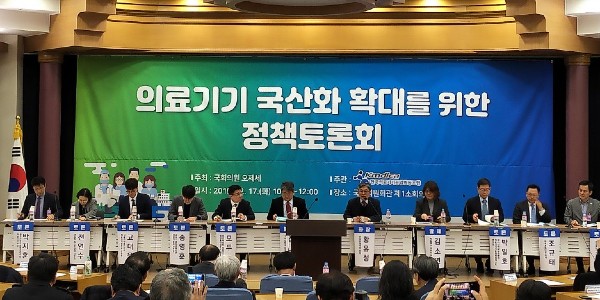To prevent the domestic medical device sector from collapsing, the government should first prepare a legal and institutional measure to promote the use of local products, an expert said.
Officials from local medical devices makers held a policy debate for broader use of domestic medical devices at the National Assembly on Tuesday. The participants emphasized that they could expand their business overseas only if they have a strong domestic demand.

Kim So-youn, CEO of PCL, argued that Korea needs to revise the “Act on Contracts to Which the State is a Party” to expand the government’s purchase of innovative medical devices.
Although the local medical device sector is growing, clinicians have turned away from homemade products, she said.
According to Kim, the Korean medical device market grew about 10 percent year-on-year to 6.8 trillion won ($5.8 billion) in 2018. Compared to the global medical device market’s average growth rate at 2.2 percent for six years from 2011 to 2016, the Korean market’s growth pace is much faster.
However, domestic medical institutions relied more on imported medical devices than local ones. The market share of domestic medical devices stands at 54 percent at hospitals, 19.9 percent at general hospitals, and only 8.2 percent at tertiary hospitals.
The number of Korean medical device makers had risen until 2015 but went down by 49 to 2,943 in 2016. Eighty-one percent of them are small companies, with the number of employees fewer than 20.
Local medical device companies face difficulties due to cartels and a high reliance on imported goods in the domestic market.
“For the past 30 years, a multinational medical device maker has dominated the local market. Due to the cartels, it has become more difficult to sell domestic medical devices. The poor local sales make it impossible to sell them overseas as well,” Kim said.
In the medical device industry, it is essential to raise the testing standards through quality trials and analysis and to upgrade equipment to meet the needs of end-users continuously. However, it is still difficult to sell them because physicians do not use local products, she said.
“The government needs to activate the joint purchase and aggressively promote other players to participate in the purchase,” Kim emphasized.
Another industry official said the government has to exert more effort to nurture the industry.
Cho Kyu-tae, director of sales planning/marketing department at Sejong Medical, said he has been focusing on the domestic market for 15 years but recently thought of entering the overseas market because the local business got tough. “The first question people asked me when I first knocked on the Japanese door was how much market share we had in Korea,” Cho said.
Cho said the government has already eased many regulations. Now is the time to support the industry’s growth, rather than deregulation, he said.
“The government should first help local firms settled in the domestic market. To penetrate the foreign markets, I hope they can support the local industry’s growth,” Cho said.
In response, government officials said they would lay the groundwork for local medical device companies to grow.
Song Young-hoon, deputy director of the Bioscience Technology Division at the Ministry of Science and ICT, said if the nation had a proper domestic medical device, it would not have suffered a shortage of the artificial vessel supply from the sole provider W.L. Gore.
To promote the use of local medical devices, hospitals and physicians should participate more in their application, he said. The science ministry was pushing for a policy to encourage the participation of hospitals and doctors, too, Song added.
The government starts the “Pan-Government, All-Cycle Medical Device R&D Project” next year to develop medical devices that can be used and sold in the field, Song said. “By the time the project ends, we hope we could see a successful case. I hope the private sector could work with us to yield a good result.”

